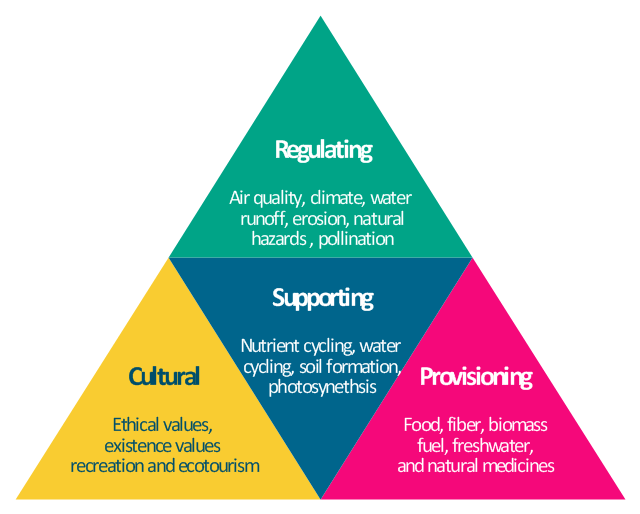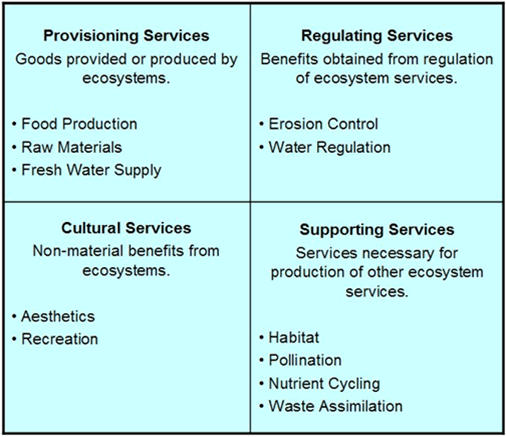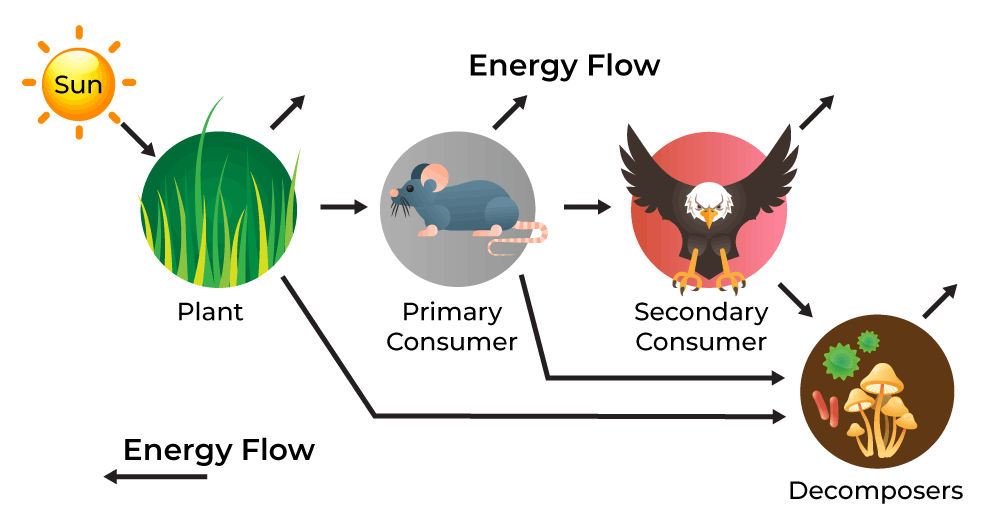Topic what is a provisioning ecosystem service: Discover how provisioning ecosystem services nurture humanity, offering vital resources like food, water, and materials, essential for sustaining life and advancing societies.
Table of Content
- What are examples of provisioning ecosystem services and how do they benefit people?
- Definition and Importance of Provisioning Services
- Types of Provisioning Services: Food, Water, Raw Materials
- Role of Ecosystems in Providing Services
- Impact of Human Activity on Provisioning Services
- Case Studies: Examples of Provisioning Services in Action
- Challenges and Threats to Provisioning Services
- YOUTUBE: Ecosystem Services Provisioning
- Conservation and Sustainable Management Practices
- The Future of Provisioning Services and Human Well-being
What are examples of provisioning ecosystem services and how do they benefit people?
Provisioning ecosystem services are essential benefits that people derive from natural ecosystems. These services are crucial for meeting basic human needs and play a vital role in sustaining livelihoods. Here are some examples of provisioning ecosystem services and how they benefit people:
- Food: Ecosystems provide a variety of food resources such as fruits, vegetables, meat, and fish. These resources are essential for nutrition and sustenance.
- Water: Ecosystems play a critical role in regulating the water cycle and providing freshwater resources. Clean and accessible water is essential for drinking, agriculture, and sanitation.
- Medicinal Plants: Many medicinal plants and herbs are sourced from natural ecosystems. These plants have therapeutic properties and are used in traditional medicine practices.
- Fuelwood: Ecosystems provide biomass resources such as wood and charcoal for cooking and heating purposes. Sustainable harvesting of fuelwood is vital for energy security.
- Fiber and Materials: Natural ecosystems supply materials like wood, fibers, and resins that are used in various industries such as construction, textiles, and crafts.
Overall, provisioning ecosystem services are crucial for human well-being, economic prosperity, and cultural practices. They highlight the intricate relationship between nature and society, emphasizing the importance of sustainable ecosystem management for the continued benefit of people.
READ MORE:
Definition and Importance of Provisioning Services
Provisioning ecosystem services are the essential goods directly obtained from ecosystems, vital for human survival and well-being. These services include the supply of food, water, wood, fiber, and genetic resources, all of which play a critical role in sustaining human life and economic development.
- Food: Includes the vast array of edible resources like fruits, vegetables, and meat derived from plants and animals.
- Water: The freshwater we drink and use for agriculture, sourced from natural ecosystems.
- Raw Materials: Materials for construction, clothing, and tools, such as wood, fibers, and resins.
- Medicinal Resources: Many pharmaceuticals are derived from plant and animal products found in natural ecosystems.
The importance of provisioning services extends beyond mere survival, contributing significantly to the economic and cultural aspects of human societies. They are the foundation of agricultural and industrial sectors, support livelihoods, and are integral to the traditions and cultural heritage of communities around the world. However, these services are under increasing threat from overexploitation, environmental degradation, and climate change, highlighting the need for sustainable management to ensure their availability for future generations.

Types of Provisioning Services: Food, Water, Raw Materials
Provisioning services are the backbone of ecosystems, offering direct benefits crucial for human survival. These services include:
- Food: This encompasses all types of consumables provided by nature, including fruits, vegetables, grains, livestock, and fish. Such diversity in food sources ensures nutritional needs are met for a variety of diets around the globe.
- Water: Essential for life, clean freshwater sourced from ecosystems is used for drinking, irrigation, and sanitation. The natural filtration processes of ecosystems play a vital role in providing this critical resource.
- Raw Materials: Ecosystems supply materials for construction, manufacturing, and crafts. This includes wood from forests, fibers for clothing, and other organic materials used in daily life.
Each type of provisioning service is indispensable, supporting not just individual well-being but also economic activities and cultural practices. The availability of these services is closely tied to the health of ecosystems, underlining the importance of sustainable management and conservation efforts to ensure their continuity for future generations.
Role of Ecosystems in Providing Services
Ecosystems play a crucial role in provisioning services by functioning as natural factories that produce essential goods for human survival. The interaction between different components of an ecosystem, such as plants, animals, soil, and water, leads to the production of resources that are indispensable to human life.
- Biological Processes: These are at the heart of provisioning services, where ecosystems through their biological processes, such as photosynthesis, nutrient cycling, and water filtration, contribute to the production of food, purification of water, and regeneration of soil fertility.
- Natural Habitats: Ecosystems provide habitats for a wide range of plant and animal species, which are sources of food, medicine, and genetic materials for human use.
- Regulation of Water Cycles: Ecosystems regulate the water cycle, ensuring the availability of fresh water through processes like evaporation and precipitation. This regulation is vital for drinking water, agriculture, and hydroelectricity.
- Soil Formation and Protection: Ecosystems contribute to soil formation and protect it from erosion, maintaining soil health which is essential for agriculture and forestry.
Understanding the role of ecosystems in providing these services highlights the interconnectedness of nature and human well-being. It underscores the importance of conserving and sustainably managing ecosystems to ensure that provisioning services continue to support life on Earth for generations to come.

Impact of Human Activity on Provisioning Services
Human activities have a profound impact on provisioning services, affecting the capacity of ecosystems to provide essential goods. These impacts include:
- Land Use Change: Agriculture, urbanization, and deforestation alter ecosystems, reducing their ability to offer services like food production and water regulation.
- Pollution: Water, air, and soil pollution degrade ecosystems, affecting the quality and availability of resources such as clean water and fertile soil.
- Overexploitation: Overfishing, overhunting, and excessive harvesting of resources lead to depletion of species and degradation of ecosystems, threatening their sustainability.
- Climate Change: Alters precipitation patterns, increases temperatures, and leads to extreme weather events, impacting ecosystems" ability to provide services.
The consequences of these activities not only threaten the provisioning services but also the well-being of communities that directly depend on these services for their livelihoods. Sustainable management and conservation efforts are essential to mitigate these impacts and ensure the long-term availability of provisioning services for future generations.
Case Studies: Examples of Provisioning Services in Action
- The Amazon Rainforest - Biodiversity and Food Provision: Home to thousands of plant and animal species, the Amazon plays a critical role in providing food resources, medicinal ingredients, and raw materials, showcasing the rich biodiversity essential for global food security and health.
- The Great Barrier Reef - Water Quality and Fisheries: This marine ecosystem not only supports a diverse range of marine life but also contributes to the purification of water and sustains commercial fisheries, demonstrating the interconnectedness of ecosystems and economic livelihoods.
- Midwestern United States - Agricultural Productivity: The fertile soils of the Midwest underpin the agricultural productivity of the region, providing staple crops such as corn and wheat, which are essential for feeding the global population.
- The Sahel Region of Africa - Water Management and Food Security: Innovative community-led water management practices in the Sahel demonstrate how sustainable management of ecosystem services can lead to enhanced food security and adaptation to climate variability.
These case studies illustrate the critical role that diverse ecosystems play in providing provisioning services. They underscore the necessity of preserving ecosystem health to ensure the continued availability of these services, highlighting the impact of conservation efforts and sustainable management practices on global well-being.

Challenges and Threats to Provisioning Services
Provisioning services face numerous challenges and threats that could significantly diminish their capacity to support human well-being. Key issues include:
- Environmental Degradation: Pollution, deforestation, and other forms of environmental degradation can severely impact the ability of ecosystems to provide necessary resources.
- Climate Change: Alters ecosystems and their productivity, affecting the availability of water, food, and other resources.
- Overexploitation: Unsustainable harvesting of resources, such as overfishing and excessive logging, leads to the depletion of natural stocks.
- Urbanization: The expansion of urban areas into natural landscapes reduces the land available for ecosystems to function and provide services.
- Biodiversity Loss: The loss of species due to human activities undermines the resilience of ecosystems and their ability to provide various services.
- Policy and Management Failures: Inadequate policies and poor management practices can exacerbate the threats to provisioning services, leading to a decline in their availability and quality.
Addressing these challenges requires integrated and sustainable approaches to manage natural resources, ensuring the resilience of ecosystems and the continuation of provisioning services for future generations.
Ecosystem Services Provisioning
Explore the fascinating world of provisioning in this engaging video that showcases the importance of efficient resource management and distribution. Learn how effective provisioning can streamline operations and drive productivity to new heights!
Ecosystem\'s Provisioning Services
Dive into the dynamic ecosystem of our planet with this captivating video that unravels the intricate interactions between living organisms and their environment. Discover the beauty and complexity of nature\'s balanced network in action!
Conservation and Sustainable Management Practices
Conservation and sustainable management of provisioning services are essential for maintaining ecosystem health and ensuring the continued availability of the resources upon which humans depend. Effective strategies include:
- Protected Areas: Establishing and effectively managing protected areas to conserve biodiversity and ecosystem functions.
- Sustainable Agriculture: Implementing agricultural practices that increase productivity without compromising ecosystem health, such as agroforestry, organic farming, and integrated pest management.
- Water Resource Management: Adopting practices that ensure sustainable water use, including rainwater harvesting, efficient irrigation techniques, and protection of watersheds.
- Restoration Projects: Restoring degraded ecosystems to revive their productivity and capacity to provide provisioning services.
- Regulations and Policies: Enacting and enforcing laws and policies that promote sustainable resource use and protect ecosystems from overexploitation and degradation.
- Community Involvement: Engaging local communities in conservation efforts and decision-making processes to ensure the sustainable management of resources.
- Eco-certification and Sustainable Trade: Encouraging sustainable trade practices and eco-certification for products that meet specific environmental standards.
Through these and other measures, it is possible to balance human needs with the health of the planet, ensuring that provisioning ecosystem services continue to support current and future generations.

READ MORE:
The Future of Provisioning Services and Human Well-being
The future of provisioning ecosystem services and their contribution to human well-being hinges on our collective actions towards environmental sustainability. As we face the challenges of climate change, biodiversity loss, and resource depletion, the importance of these services has never been more evident. Forward-looking strategies include:
- Adopting Innovative Technologies: Leveraging technology to improve the efficiency and sustainability of food production, water management, and material extraction without harming ecosystems.
- Enhancing Ecosystem Resilience: Strengthening the resilience of ecosystems through restoration efforts, conservation, and sustainable management practices ensures their capacity to provide services under changing conditions.
- Integrating Ecosystem Services into Policy: Policymakers must recognize the value of ecosystem services in decision-making processes to protect and enhance these services for the future.
- Public Awareness and Education: Increasing awareness and understanding of the importance of provisioning services can drive support for conservation efforts and sustainable lifestyle choices.
- Collaborative Global Efforts: International cooperation is crucial in addressing global challenges such as climate change that threaten provisioning services, requiring concerted efforts to mitigate impacts and adapt to changes.
By prioritizing the health of our planet"s ecosystems, we can ensure the continuity of provisioning services that are fundamental to human well-being. Embracing sustainability, innovation, and cooperation will pave the way for a future where both people and the planet thrive.
Embracing the stewardship of our planet"s provisioning services ensures a sustainable future, nurturing the well-being of humanity and preserving the natural world for generations to come.












